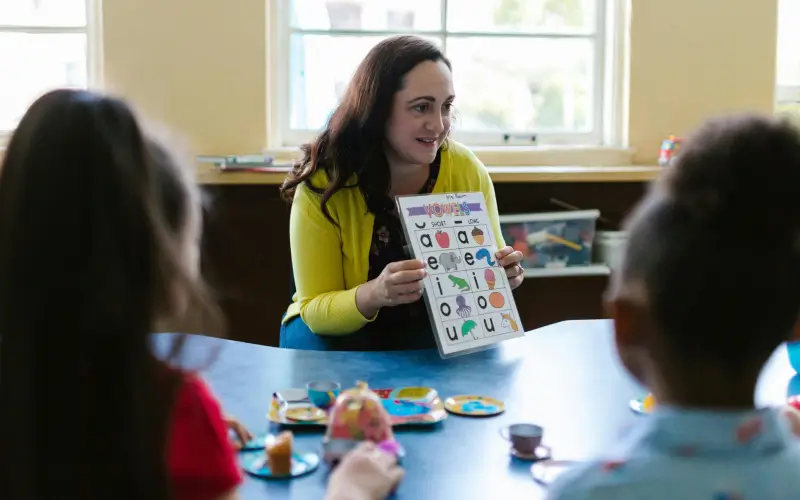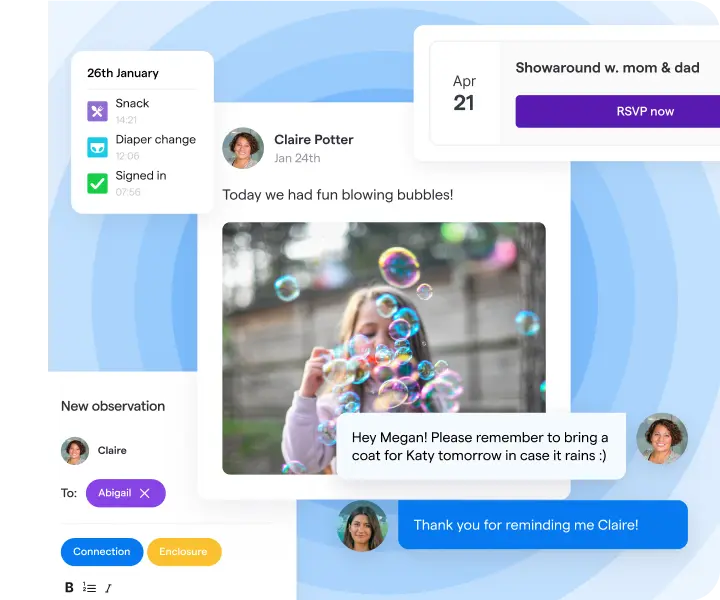settings
children
With Famly since
Childcare providers are overwhelmed, but that shouldn’t be the norm.
From juggling a room full of little ones, navigating 750 licensing requirements, training staff, and keeping families in the loop, early childhood providers are busy (to say the least). With so many competing priorities, and constantly being pulled in all different directions, it can feel like there is little-to-no joy in your day.
To start, you’re doing the miraculous work of helping a group of young children develop and grow into kind, capable, curious, unique beings, and keeping them safe. That in itself is a full-time job. On top of providing the best quality of care, you’re documenting observations and assessments, tracking all incident and accident reports, communicating with parents and other staff, changing diapers…ok, I could go on, but you get the idea. And not to mention, no days are the same, and who knows what mishaps will happen.
It’s no wonder that burnout isn’t just common—it’s inevitable.
At Famly, we believe it shouldn’t be this way. Your day should be filled with what brings out your glimmers (what brings you joy and fuels you), not your triggers. Running a successful childcare business shouldn’t come at the expense of your own well-being.
That’s exactly why we keep asking, listening, and learning.
We surveyed early childhood owners, directors, and educators across the country to understand what’s driving stress, and what could actually help. Not just to gather data—but to better understand how to help bring some of that cheer back to their days.
In this summary, you’ll learn more about the most common stressors, how it’s impacting ECE staff’s time, and how Famly can alleviate some of the biggest challenges - ultimately, bringing that joy back.

The takeaways
1. Top stressors of childcare staff mostly revolve around parent communication
Two of the top three centered around communication:
- Communicating with parents
- Double-checking that staff are communicating appropriately with parents
Honestly? We weren’t surprised. With parents more engaged than ever, and ever-growing research that it takes a village, parent and family engagement should be a focus in early childhood settings. But, there’s a catch.
Parent communication is a balancing act
We hear this all the time from directors and educators - communication with families is a constant balancing act. How can parents have enough visibility that they feel connected to their child’s growth, while not opening the door to endless questions, nitpicking, or interruptions?
You want to partner with families, of course. But, in the classroom, teachers need to focus on engaging with and keeping children safe, and every extra communication can pull you away from that.
Are staff communicating appropriately?
We also hear that part of what makes parent communication stressful for directors is the extra time it takes to double-check that all staff messages are friendly, professional, and strengthen the parent-staff partnership. One director I spoke with was worried that her team’s frequent typos were degrading parents’ trust in her program.
We get it—teachers are juggling a room full of young children. Grammar isn’t going to be top of mind when there are three tantrums, a surprise inspection, and realizing that little Aidan’s on his last diaper happening all at once. It’s easy to send off a quick, “Send more dipers tomorrow.” As a result, it falls back on the director’s plate to review and reword, adding one more thing to an already never-ending to-do list.
A cycle of distrust starts to build. Staff are spread thin and send an unpolished message. So, directors don’t feel like they can trust staff, and they review every message. Staff then feel micromanaged and leave. And we all know how staff shortages add to burnout. There’s no room for joy in this vicious circle.
The solution? Provide teachers with tools that make clear, appropriate, and engaging messages effortless.
Directors need a way to take that pressure off themselves!. Famly’s Sidekick writing assistant was designed to put the power of professional communication in the hands of anyone working in childcare. Sidekick doesn't just perfect spelling and grammar—it can improve the tone of a message in one click with choices like ‘make it friendlier’ or ‘make it more professional.’ Plus, directors won’t need to doublecheck messages—and won’t turn into the micromanager they never set out to be.

2. Another top stressor? Staff management.
The second most-common stressors mentioned in the survey responses fell under an umbrella category of “staff management.” These tasks included:
- Double-checking their team’s lesson plans
- Staff scheduling
- Hiring new staff
Managing your team isn’t just about logistics — it’s about trying to be a mentor, coach, and safety net all at once. And when every small decision affects quality of care, it’s no wonder it weighs so heavily.
Outside of double-checking staff’s messages with families, directors are spending time reviewing their team’s lesson plans each week. And it’s not a simple glance over. The director has to ensure the activities are checking a number of boxes: Are the activities developmentally appropriate? Are they aligned with a program’s curriculum? Are they actually supporting children’s development? And, do they adhere to any curriculum, accreditation, pedagogy, or state requirements? And finally, are families going to understand how activities support their children’s growth?
And staff scheduling? Of course it’s stressful! You have so many different types of employees: full-time, part-time, substitutes, parent helpers, and don’t get me started on the high turnover rate, which means there is constantly an open job ad, and you’re constantly going through the interviewing process.
Oh, and not to mention that you have to always meet ratio. Teachers and children get sick, families make quick decisions to leave - attendance can change instantly, meaning your staff’s schedule can change each morning.
3. Rounding up top stressors: attendance, occupancy, and waitlists
Survey respondents chose attendance and occupancy tracking, and managing waitlists as one of their top stressors. After all, your business’s doors can only stay open if you have enough paying families.
The big ideas
That’s where Famly steps in—as your behind-the-scenes partner, taking the stress out of everyday logistics so you can focus on what really matters.
- Get out of the staffing weeds. Famly’s staff scheduling tool works for every staff type—giving you one clear, editable overview of schedules, shift swaps, time off, and more.
- Know your ratios in real time. Because scheduling, sign-ins, and attendance live in one system, ratios update instantly. Never second-guess whether you're in compliance!
- Make enrollment easy. Custom registration forms help you skip manual data entry as each new family joins your program.
- Support your hiring process. While we can’t conduct interviews for you, we’ve pulled together free resources to help you attract and retain staff.
- Grow your center. And while we won’t market your program ourselves, we have the guides you need to fill open slots.
Famly was built to take things off your plate—so you can spend less time managing, and more time leading.

4. Many of your top stressors are also what are the most time-consuming
It’s not fair, but it’s the reality because of all the priorities and tasks that directors and educators are responsible for.
In order to better understand what are the most time-consuming tasks, we asked: What’s eating up the most time in your day?
Unsurprisingly, there was a lot of overlap between what stresses you out the most and what steals the most hours.
The top 3 most time-consuming tasks were:
- Double-checking staff’s activity plans to make sure they align with your curriculum
- Attendance tracking, occupancy reporting, and managing waitlists
- Double-checking all communication to make sure staff are messaging families appropriately
Notice a pattern?
Two out of the three biggest time-consuming tasks involve reviewing someone else’s work. And when your day’s already maxed out, spending time redoing what others already ‘finished’ is inefficient and exhausting.
It’s a vicious cycle: You delegate to save time, but then you lose that time reviewing, editing, and adjusting. And we get it—you have to double-check, because quality and professionalism matter. But it shouldn’t have to come at the cost of your sanity and time.
Take back your time
- Stop double-checking staff messages. With the Sidekick Writing Assistant mentioned above, directors don’t need to worry as much about managing teacher-family communication. In the click of a button, staff can get rid of typos and keep their notes kind and clear.
- Streamline lesson planning. Famly’s activity planning process is easy with our week-by-week lesson planning overview. Plus, once an activity has been approved, you can save it in the activity library for re-use and sharing with other teachers.
- Support your children’s growth. Activities can be labeled with which area of child development it is supporting.
- Project your revenue. Attendance tracking and occupancy reporting is completely done for you within Famly.: With digital check-ins and outs, custom enrollment forms, and automated reports ,you can see past, current and projected occupancy - all designed to make it easy to take care of your business.
5. You really are overworked
The survey results showed just how much you’re doing each week:
- 89% of respondees work after hours at least 1 day each week
- 53% stay after hours 3 or more days of the week

So what’s keeping ECE staff working late?
Turns out, it’s not one big task dragging you down—it’s all the little, necessary admin jobs that keep getting bumped to “later.” And when caring for kids is itself a full-time job, it leaves no time for all the other tasks - a ton of documentation and paperwork, reporting, and compliance requirements to keep your center running smoothly.
In the survey, the most common tasks that are done after hours are:
- Catching up on emails
- Miscellaneous paperwork
- Observations and assessments
- Immunization and accident reports
- Budgeting and finance management
- Staff scheduling
- Creating reports
Pushing these tasks to tomorrow isn’t really an option. Instead, you’re staying after hours or taking paperwork home. And that’s not okay. Getting your work done shouldn’t have to come at the cost of your evenings, your weekends, and your mental well-being.
“Well it really is magic! Compared to what I was doing before, oh yes, it takes me half the time or less for me to do things.”
– Julia Mason, Office Manager at Angel Land Preschool
Stop letting admin rule your day
We can’t do your whole to-do list (if only!), but we can automate and streamline a lot of it, which will cut the time you spend on admin tasks by half (or more).
“How do we do it,” you ask? Here are just a few ways:
- Real-time messaging, on any device. No more inbox overflow. Families can message you directly in Famly, with instant notifications. Respond right away—or save it for when you’re ready.
- Conduct observations and assessments in a few clicks. Record in-the-moment notes about children’s progress in just a few clicks, then expand and polish when you have time.
- Headache-free finance management. Automated invoices and reminders, in-platform payments, and easy-to-understand reports are generated to help you budget and forecast revenue.
- Staff scheduling made simple. Full-time, part-time, substitutes, assistants, administrators, all in one clean and clear overview (plus with automated ratio tracking!).
Our goal is simple: to support early childhood staff, who are the real superheroes.
We want you spending your workday doing what you’re the expert at—building relationships, fostering learning, shaping young lives—not debating whether you have time to squeeze in one more form before pickup. Let Famly handle the busywork, so you can do what you do best, and get home to the “you” time you deserve.
6. Parent engagement is, well, complicated
When looking a bit deeper into staff’s perception on parent engagement, it seems there a parent engagement dilemma. Educators and directors truly want families to be involved, but there’s an important catch: how families engage matters just as much as whether they engage.
- 38% consider families highly engaged in the community and in their child’s learning
- 38% consider families to be too overbearing and demanding. But…
- 90% of respondents want more parent engagement.
Most agree that open, consistent, direct communication is essential in a child’s successful growth and development. Yet, how you communicate determines whether interactions with families are helpful, disruptive, or even hurtful. For example, when a parent is constantly calling and checking in, they are interrupting teachers from engaging with children. Plus, these disruptions can also make teachers feel as if they are not trusted - that parents don’t believe they can adequately care for their child.
So while respondents do want more parent engagement, it’s clear it has to be the right kind — the kind that supports educators (and ultimately, supports the children too).

Does your role shape how you see parent engagement?
To better understand this data, we broke the data down by staff role. And what we found strongly suggests that the nature of your role in a center shapes how you perceive family engagement.
- The majority of directors and owners described families as “engaged in the community and their child’s learning.”
- The majority of office managers and administrators, however, described families as “overbearing and too demanding.”
Why the difference?
Likely, it comes down to proximity and responsibility.
Office managers and administrators are often the first point of contact for families. They answer the phones, respond to emails, and field parent concerns throughout the day. If a parent is trying to reach a teacher who’s unavailable — and calls back multiple times — it’s the administrator who handles that friction. They’re also the go-to for prospective families navigating enrollment, which can involve a flurry of questions and expectations.
Meanwhile, directors and owners, especially in larger programs, may be a step removed from these everyday interactions. That distance may offer a broader — and possibly more generous — perspective on overall engagement.
This role breakdown reveals that while everyone wants strong relationships with families, your day-to-day experience with them can really shape how you feel about that engagement.
Bottom line? Everyone’s on the same page about wanting parents involved — but how that looks and feels can vary a lot depending on your role. And that’s something we need to keep in mind when we talk about improving communication and building better partnerships with families.
Build trust without adding to your workload
Strong parent partnerships are at the heart of every great early childhood program. But managing that communication shouldn’t derail you and your team. At Famly, we are proud that one of our core values is collaboration, specifically among all the adults in a child’s life. Our parent engagement features make collaboration easier and more transparent.
- Keep families engaged without the need for back-and-forth communication. A secure, private newsfeed gives families a real-time window into their child’s day—without relying on phone calls or email chains.
- Offer space for messaging on your own time . Private messages let you connect directly with families, answer questions, and send reminders when you have the time. No pressure to respond instantly—but peace of mind that parents will know you’ve seen their message.
- Keep everyone aligned. Shared activity logs and lesson plans help families stay connected to their child’s learning journey—without creating extra work for staff.
- Step in when needed, without micromanaging. Director oversight means you can step in if a teacher’s tied up and a parent message needs a quick response. Everyone stays in the loop, and nothing falls through the cracks.
- Get more transparency. Not surprisingly, this is a fan favorite of Famly users— read receipts. You’ll always know when a parent has seen your message—or when it’s time for a gentle nudge at pickup.
The work you do matters. You deserve tools that make your day easier — not harder. And you deserve to end each day feeling fulfilled, not just checked out. That’s what we’re working towards at Famly.
.webp)
Get the full report here.
Top tips from Reynolda Preschool
Get top tips from a preschool just like yours. Hear from Reynolda Preschool on why and how they use Famly - and why they’ve never looked back.
Read their story








%20(2).png)
